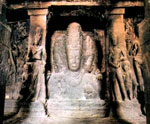 |
Sixth Working IEEE/IFIP Conference on Software Architecture WICSA 2007 Mumbai, India January 6 - 9 2007 |
 |
|
Software Architecture: The Integration of Theory and Practice WICSA 2007 is the premier international gathering of software architecture researchers and practitioners. WICSA 2007 is the sixth international conference devoted entirely to Software Architecture. Its purpose is to bring together software engineering practitioners and researchers from industry and academia to exchange experiences, results and ideas related to all aspects of software architecture. WICSA 2007 will be the ideal venue for identifying and discussing the key challenges facing practicing software architects, and for helping to set the research agenda for our community. Submissions are invited for research papers, working session papers, and proposals for half-day or full-day tutorials. Research papers should describe original and significant work on the theory and practice of software and system architectures. Accepted research papers will be presented in plenary sessions. Accepted working session papers will be used as the basis of discussion in the working sessions, whose purpose is to provide a forum for software researchers and practitioners to communicate about the benefits and weaknesses of current software architecture practice and research. Practitioners are asked to describe best and worst experiences from the trenches, and researchers are asked to describe areas where research progress is slowed because of lack of access to real world problems. All accepted papers will appear in the conference proceedings. Full submission guidelines can be found on the WICSA Web site. Topics of interest for WICSA 2007 include but are not restricted to: Looking Back; Looking Forward
Software Architecture in a Broader Context
Software Architecture-Based Development
Qualities-of-Service
Role of Software Architecture in Industry
Working Sessions: WICSA 2007 will include a panel of leaders
in the field to discuss their views on the past, present, and future of
the field. Based on the accepted working session papers and the
challenges identified by the panel, a significant portion of WICSA 2007
will be organized into working sessions. The results of these sessions
will be prepared and presented to all attendees at the end of the
conference and is intended to serve as a "call to action" to the
software architecture community. The proceedings will be published after
the conference so that it can contain the results of the working
sessions. Electronic versions of the papers will be distributed at the
conference, and available prior to it, via download. Paper Submissions: Full papers should be submitted in IEEE 2
column format, and be limited to 10 pages in length. Working paper
sessions should be in IEEE 2 column format, and be restricted to 4
pages. For paper submission, click
here
|